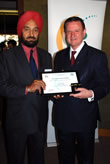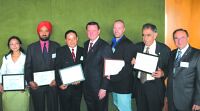Sikh of Sikhs, Bawa Jagdev has been rewarded for his services to the community at the Strangers Room at the NSW Parliament House on 8 February 2007 AD ...

Some friends and family amongst us are more than willing to go the extra mile on behalf of the weakest in our community. Bawa Singh Jagdev has contributed immensely to the Sikh community developing many education, religious and cultural programmes for the community. He was instrumental in establishing the first religious place of worship for the Sikh Community along with weekend language schools. Other significant work undertaken by Bawa for his community includes the provision of free meals for the community, the establishment of a free meditation area and the organisation of many cultural and sporting events, not only for members of the Sikh background but also those of Muslim, Hindu and Christian backgrounds. The 2006CRC Lifetime Achievement in Community Sector: Mr Bawa Singh Jagdev

The existence of the spirit world The costs of volunteering
Independent Weekly this week, on 10/02/2007, shares story by Moira Deslandes. Volunteers are an integral part of our society. More than six million Australians over the age of 18 volunteer each year and of that number, South Australians are leading the way with volunteering commitments
VOLUNTEERS are an integral part of our society. More than six million Australians over the age of 18 volunteer each year and of that number, South Australians are leading the way with volunteering commitments. At least one out of every two (or610,000 South Australians) freely share their time and skills with others.
This equates to 72.8 million hours volunteered each year. This investment in volunteering
returns dividends to our state, building our social, economic, cultural and environmental capital. However, in October 2006, Volunteering Australia conducted an online survey which found almost all volunteers (88 per cent) incur out-of-pocket expenses that are not reimbursed. Some 1,245 respondents completed the survey, of which 724 were volunteers and 466 were representatives of volunteer involving organisations. The remaining 55 respondents were from groups such as
government, media and business. The survey found that out-of-pocket expenses amounted to $600 on average for each volunteer and these costs caused sufficient impact on one-in-10 volunteers to force them to stop or reduce their volunteering participation.
Many other volunteers, although financially worse off, felt they were unable to relinquish their commitments due to the demand for the services that they provided, particularly in the community
services and welfare sectors. Broad areas where volunteers incur costs are transport (petrol/vehicle/public transport), telephone, safety equipment and clothing (including uniforms and their maintenance), and training. More than a quarter of volunteer involving organisations experienced an increase in reimbursement requests from volunteers over the past year.
Some organisations had to adjust their reimbursement policy or formula, or increase reimbursement levels, for example, following the impact of petrol price rises on travel expenses, and these growing reimbursement requests then compounded upon many not-for-profit organisational overheads. In the second half of this year Volunteering Australia brought together
a small taskforce of experts to look at the issue of rising costs of volunteering and to determine possible solutions. The national Costs of Volunteering Taskforce presented its report to the
Federal Government in December 2006 and urged it to consider several options outlining a national scheme to reimburse volunteers' out-of-pocket expenses.
The taskforce recommended six options that were divided into two categories:
reimbursement to the volunteer through the organisation for which they
work and personal reimbursement direct to the volunteer. It is hoped the
government will consider the options and work with the taskforce to bring.in
a simple and fair solution. Taskforce recommendations
Organisational reimbursement options:
1. Agrantprocessssimilartotheexisting
volunteer smallequipment grant (VSEG)
program through which organisations
would apply for funding on the basis
that they have reimbursed, or intend
to reimburse, volunteer out-of-pocket
expenses.
2. Government requirement for
volunteer reimbursement budget iii
funding applications from not-for-profit
organisations.
3. Tax credit to the not-for-profit organisation
- this would most effectively be
administered through the Goods &
Services Tax (GST) system as an offset
on the Business Activity Statement
(BAS) given that most not-for-profit
organisations are income tax exempt.
Personal reimbursement options:
1. A personal tax rebate.
2. A personal tax reduction.
3. A personal grant/claim process that
the volunteer would apply for directly
to the relevant government agency,
for example, the Health Insurance
Commission (ie: Medicare offices) and
provide evidence of relevant expenses.
Many volunteers don't wish to be reimbursed because they see volunteering
as a way of allowing them to meet and experience a diversity of activities
and people. Butforothers these costs are beginning to make an impact on their
participation, and this is an issue of some concern.
In Australia, we are fortunate to have a high level of volunteer involvement,
but we cannot be complacent. Our volunteers are under-recognised and
undervalued.
With more than 700,000 non-profit organisations countrywide, most of which are small and entirely dependent on the commitment of volunteers, the government and community need to do
all they can to ensure we do not experience a significant downturn in volunteer involvement, because of the rising cost of volunteering.
• Volunteer wins award; [The politics of giving; Turning a negative into a positive]
• · Prime Minister John Howard's 'decent Aussie values' test can't come quickly enough for me. A testing time for our new arrivals; Democracy is another casualty of the Iraq War: Gerhard Schroeder’s address to the survivors of Auschwitz-Birkenau. Public responsibility - lessons from the nazi era